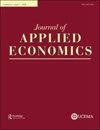Private investment and public stimulus: a bargaining model
IF 2
4区 经济学
Q3 ECONOMICS
引用次数: 2
Abstract
ABSTRACT Local governments often provide tax-subsidy programs to attract corporate investment. Using a game-theoretic real options model between a firm and a government, this paper aims to explore the interaction between the government’s tax-subsidy policy and the firm’s investment and financing decisions. The optimal incentive policies are derived for cooperative and non-cooperative bargaining settings between a government and a firm. We show that it is optimal for the government to offer a tax-subsidy combination in the cooperative setting. However, this is not true for the non-cooperative setting, in which the optimal policy is to only levy taxes with no investment subsidy. Whereas firms always have an incentive to rely on debt financing in the non-cooperative setting, firms are reluctant to issue debt in the cooperative setting. Finally, it is generally optimal for the government to collect taxes at a lower rate in the case of high risk high-tech enterprises.私人投资与公共刺激:一个讨价还价的模型
本文章由计算机程序翻译,如有差异,请以英文原文为准。
求助全文
约1分钟内获得全文
求助全文
来源期刊

Journal of Applied Economics
ECONOMICS-
CiteScore
3.00
自引率
0.00%
发文量
57
审稿时长
40 weeks
期刊介绍:
The Journal of Applied Economics publishes papers which make a significant and original contribution to applied issues in micro and macroeconomics. The primary criteria for selecting papers are quality and importance for the field. Papers based on a meaningful and well-motivated research problem that make a concrete contribution to empirical economics or applied theory, in any of its fields, are especially encouraged. The wide variety of topics that are covered in the Journal of Applied Economics include: -Industrial Organization -International Economics -Labour Economics -Finance -Money and Banking -Growth -Public Finance -Political Economy -Law and Economics -Environmental Economics
 求助内容:
求助内容: 应助结果提醒方式:
应助结果提醒方式:


